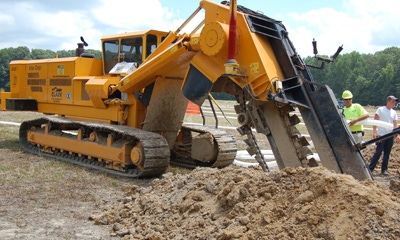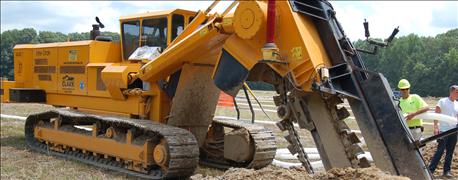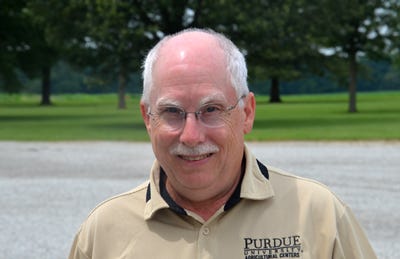
Don Biehle did his job quietly but effectively for 39 years. This unassuming but capable one-time farm boy turned excess land into a productive university research farm. He became the first superintendent of the Southeast Purdue Agricultural Center in 1977. Biehle retired earlier this summer.
Biehle sat down with Indiana Prairie Farmer for an interview. The focus was on insights into what made him successful.
IPF: How did you get the job as superintendent?
Biehle: It may have been just because I was from Jennings County and knew the area. I grew up on a small farm not far from here. I found out the job was open, graduated from Purdue and started here that spring.

SEPAC WORKDAY: The Indiana Land Improvement Contractors Association held a field day at the Southeast Purdue Ag Center in 2010, demonstrating the most modern methods in installing tile systems.
IPF: What was the first year like?
Biehle: We started from scratch. One of the first things I had to do was go buy tools, like pliers and wrenches and the like. We not only didn’t have farm equipment, we didn’t have anything at first.
IPF: What helped you get through those first few years?
Biehle: I was fortunate to work with some very good researchers who wanted to do research here. Larry Bledsoe from entomology at Purdue was very helpful. Vic Lechtenberg did work here. Later he became dean of the Purdue Ag School, and is now in administration at Purdue. There were many others. They helped me, and I learned as I went along.
IPF: You have gained a reputation for no-tilling and using cover crops whenever possible. Why did you decide to no-till fields that weren’t in research back then?

MEET THE MAN: Here’s a chance to learn more about Don Biehle, the man who led SEPAC for so many years.
Biehle: We had no-tilled at home because Dad worked elsewhere, and both time and equipment were scarce. Those are some of the same reasons why we started doing it here. Plus, besides wet soils we have rolling soils, and no-till worked well. We soon found out that it works well on all of our soils.
IPF: You’ve seen a lot of changes over these 39 years. Name one that stands out.
Biehle: It would have to be the coming of technology, especially computers. When I left Purdue, the most advanced computer still used punch cards. Today, we’ve got all kinds of computing power on laptops.
I remember during that period that fax machines were invented. Before that we had to send correspondence to Purdue and other farms by mail. Our director at the time decided to buy fax machines and was really excited about it. One day he called and said he was sending me his first fax, and I should look for it. It showed up, but it was a blank piece of paper. I had to call the boss and tell him to turn the paper over when he put it into the fax machine!
IPF: Your sister, Debbie Hackman, Brownstown, told us the family was betting you would go for 40 years. Why did you retire now?
Biehle: It was time. We have three children and six young grandchildren close by, and we want to enjoy them. Plus, I also am active in the local volunteer fire department and the soil and water conservation district. I’ve still got plenty to do at home every day. The difference is, I can quit in the evening and do what my wife and I want to do.
I’m only a mile away. If Joel Wahlman (his replacement) needs something, he knows I’ll be here to help. It’s just time for him and his staff to take SEPAC into the future.
About the Author(s)
You May Also Like




